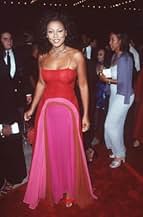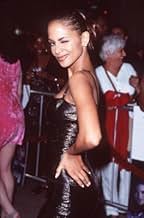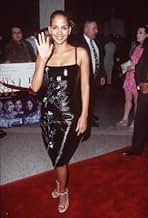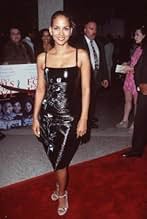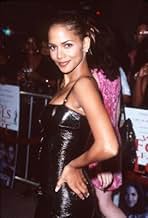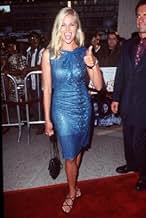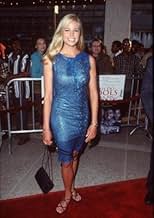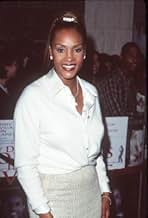AVALIAÇÃO DA IMDb
6,4/10
4,7 mil
SUA AVALIAÇÃO
Adicionar um enredo no seu idiomaThree women each claim to be the widow of 1950s doo-wop singer Frankie Lymon, claiming legal rights to his estate.Three women each claim to be the widow of 1950s doo-wop singer Frankie Lymon, claiming legal rights to his estate.Three women each claim to be the widow of 1950s doo-wop singer Frankie Lymon, claiming legal rights to his estate.
- Direção
- Roteirista
- Artistas
- Prêmios
- 2 vitórias e 4 indicações no total
Miguel A. Núñez Jr.
- Young Little Richard
- (as Miguel A. Nunez Jr.)
Avaliações em destaque
An interesting (but flawed account) of the battle over pop star Frankie Lymon's estate by three women claiming to be his widow...
The story portrayed here is actually semi-fictitious, but the background story of Frankie's life is entirely true.
From his starts as a fresh-faced Harlem kid to a haunted drug addict, Larenz Tate (one of the most underrated talents in Hollywood) shines as dreamer Frankie, and does well to give perspective to Frankie's conflicting attitudes towards his relationships with the women, which the script muddles- Frankie appears shallow yet introspective at the same time.
Halle Berry tries to make more of her understated and thin role as Zola Taylor, wifey no. 2, but provides an adequate performance.
The most developed of the three female characters, is Elizabeth Waters (Viveca A. Fox). Loyal yet dishonest, gritty Elizabeth is the only character aside from Frankie that seems to be real. This is a combined effort by the characterisation and the performance by Fox.
And Lela Rochon does very well cast against type, as a school marm dragged into this battle. Rochon clearly understands the character well, and manages to make her mark on the story despite being developed late into the film.
The period detail of this piece is well captured over the 20-odd years that this story is set (particularly the performances of Frankie with the Teenagers), and even the small scenes which provide insight into Frankie's younger days.
The main flaws of this film lie essentially in the struggle to develop some of the themes. As mentioned earlier, Frankie's reasons for bigamy are not established at all or how he copes this with this, or whether one of the wives in particular is lying about the legitimacy of her marriage.
Some of the characterisation is a bit thin, caused by some of the later events of the film and because this deep story of fame, loss, betrayal and torment has such a muddled structure the whole film comes across as sketchy by the end which clearly was not intended.
But never the less this is an adequate tribute, to the world of fame and its inevitable clingers-on, and those just caught up in the action. This will never be top of its genre however...
The story portrayed here is actually semi-fictitious, but the background story of Frankie's life is entirely true.
From his starts as a fresh-faced Harlem kid to a haunted drug addict, Larenz Tate (one of the most underrated talents in Hollywood) shines as dreamer Frankie, and does well to give perspective to Frankie's conflicting attitudes towards his relationships with the women, which the script muddles- Frankie appears shallow yet introspective at the same time.
Halle Berry tries to make more of her understated and thin role as Zola Taylor, wifey no. 2, but provides an adequate performance.
The most developed of the three female characters, is Elizabeth Waters (Viveca A. Fox). Loyal yet dishonest, gritty Elizabeth is the only character aside from Frankie that seems to be real. This is a combined effort by the characterisation and the performance by Fox.
And Lela Rochon does very well cast against type, as a school marm dragged into this battle. Rochon clearly understands the character well, and manages to make her mark on the story despite being developed late into the film.
The period detail of this piece is well captured over the 20-odd years that this story is set (particularly the performances of Frankie with the Teenagers), and even the small scenes which provide insight into Frankie's younger days.
The main flaws of this film lie essentially in the struggle to develop some of the themes. As mentioned earlier, Frankie's reasons for bigamy are not established at all or how he copes this with this, or whether one of the wives in particular is lying about the legitimacy of her marriage.
Some of the characterisation is a bit thin, caused by some of the later events of the film and because this deep story of fame, loss, betrayal and torment has such a muddled structure the whole film comes across as sketchy by the end which clearly was not intended.
But never the less this is an adequate tribute, to the world of fame and its inevitable clingers-on, and those just caught up in the action. This will never be top of its genre however...
The filmmakers know you've heard this tale before - true life chronicle of a young singing star's rise and tragic fall - and so they wisely downplay the standard bio trappings and instead focus on a raucously entertaining ride through Frankie Lymon's woman troubles. The smart screenplay revolves around the court battle of Lymon's three wives (yes, three!) over song royalties, leading to vivid (and often humorously contradictory) flashbacks of their lives with the singer. Larenz Tate is magnetic playing the many different sides of the ever-changing lead character, but the film ultimately belongs to Halle Berry, Vivica A. Fox and Lela Rochon as the wives. Each is allowed to shine as the trio portrays 30 years of changes in the women's lives, with Fox drop-dead hilarious as the most outrageous of the three. There's beautifully detailed '60s-era cinematography, sets, costuming and musical numbers, plus a side-splitting turn by Miguel Nunez as a young Little Richard. Major issues (such as '60s race relations) are barely glanced at, but what this film lacks in depth, it makes up for ten-fold in entertainment value. A winner!
I don't believe this movie didn't do better in the ratings. I thought it was clever and entertaining. Halle Berry is beautiful and Larenz Tate was engaging as Frankie Lymon. Again, Gregory Nava is a director to watch for. I didn't realize he also did Selena and that was a movie I also enjoyed. Nothing heavy or slick, no action, fires, explosions, just good story telling about characters and their relationships with one another.
It was true in the '50s and still is today: it's no exaggeration to state that most hitmaking careers are over in 18 months. Teen idols fare the worst, and such was the fate of Frankie Lymon, who scored but three Top 20 hits between February 1956 and the summer of 1957: "Why Do Fools Fall In Love," "I Want You To Be My Girl" (both with The Teenagers) and "Goody Goody" (as a soloist). After that, the industry and music buyers considered him to be yesterday's former fresh face. And, like most young teens who become overnight sensations, Frankie's firework-long popularity came to cripple him later as a) people would not accept him as anything other than a 13-year-old and b) he was utterly unprepared to cope with real life once his flash of fame had ended. An insightful peek into Frankie Lymon's mercurial life would have made a great movie -- but this isn't it. Instead, we get only a superficial look at Lymon, as the movie focuses instead on the three women who claimed to be his wife. Lymon does not deserve to be shoved into the background of his own biopic, especially as his story is representative of the rise and fall of many flash-in-the-pan artists who find themselves revered by the public one minute and then dumped into history's ashcan the next -- often before they really reach the summit of their skills. (Believe me -- as the writer of "The History Of Rock 'n' Roll," I know this all too well.) The three women battling over his estate were more a footnote to his story than the real drama and far too much time is allocated to letting the three female leads each take a star turn. Yes, Zola Taylor was the best-known of the three, but she is portrayed following her run with The Platters as an in-the-money solo star headlining live shows with her giant hit "Only You." Are the producers kidding? Zola Taylor didn't even JOIN The Platters until AFTER "Only You" had become a million-seller! The Platters scored big as the most successful hitmaking singing group of the late '50s (1955-9), despite the fact that the "group" was really lead vocalist Tony Williams -- with the others as mere background singers. (What were The Doors, for example, without Jim Morrison?) Zola only sang lead on a couple of minor Platters chart items -- and after leaving the act, immediately sank into near total obscurity. The Platters' golden era ended in 1960 after Tony left on his ill-fated solo career. (I explored this in great detail while assembling a 60-track Platters career retrospective 3-CD box set.) None of The Platters really made much money at all -- as they were mere salaried employees of their manager, Buck Ram. Ram wrote much of their material, told them what to sing and how, produced their records, owned The Platters' name and (no surprise) kept nearly all of the loot himself. The portrayal of Morris Levy, who owned several labels including Gee (the recording home of Lymon and The Teenagers) was pretty accurate. Not all record labels screwed artists as thoroughly as Levy's did, but his methods were none too unusual for the time. In fact, they're not much different than what the industry does today!
"Why Do Fools Fall In Love" is really just another average rock star biography. Larenz Tate is great as Frankie Lymon, as are Halle Berry, Vivica Fox and Lela Rochon as the three "wives" locked in a battle over his estate, but the film is way overlong. The title is certainly appropriate. For most of his career, Lymon was a habitual drug user and was at times abusive to many of the women who loved him. It seemed nobody who stood in his way was safe, especially that poor little dog he accidentally dropped out of an apartment window. When he died in 1968, many of his fans and friends were shocked at first, but then later they probably realized that he had paid the expected price for his lifestyle.
I bought this one in a previously-viewed movie bin at my local video store, but now I think I will return it. I don't think it's worth watching more than once.
Rating: **
I bought this one in a previously-viewed movie bin at my local video store, but now I think I will return it. I don't think it's worth watching more than once.
Rating: **
Você sabia?
- CuriosidadesWhen Tina Andrews wrote the original script, the part of Frankie Lymon was first offered to Michael Jackson.
- Erros de gravaçãoWhen the scenes changes to Lamberton Prison in 1985, Diana Ross' version of "Why Do Fools" is more than once referred to as a new hit, when in fact, it was released in 1981.
- Citações
Emira Eagle: Maybe there were three separate Frankies, and each of us got a piece.
- Trilhas sonorasWhy Do Fools Fall in Love
Written by Frankie Lymon and Morris Levy
Performed by Frankie Lymon and the Teenagers
Courtesy of Rhino Entertainment Company/EMI Records UK Ltd.
Principais escolhas
Faça login para avaliar e ver a lista de recomendações personalizadas
- How long is Why Do Fools Fall in Love?Fornecido pela Alexa
Detalhes
- Data de lançamento
- País de origem
- Idioma
- Também conhecido como
- Why Do Fools Fall in Love
- Locações de filme
- Empresas de produção
- Consulte mais créditos da empresa na IMDbPro
Bilheteria
- Faturamento bruto nos EUA e Canadá
- US$ 12.461.773
- Fim de semana de estreia nos EUA e Canadá
- US$ 3.946.382
- 30 de ago. de 1998
- Faturamento bruto mundial
- US$ 12.461.773
- Tempo de duração1 hora 56 minutos
- Mixagem de som
- Proporção
- 1.85 : 1
Contribua para esta página
Sugerir uma alteração ou adicionar conteúdo ausente

Principal brecha
By what name was Por que o Amor Enlouquece (1998) officially released in Canada in English?
Responda

